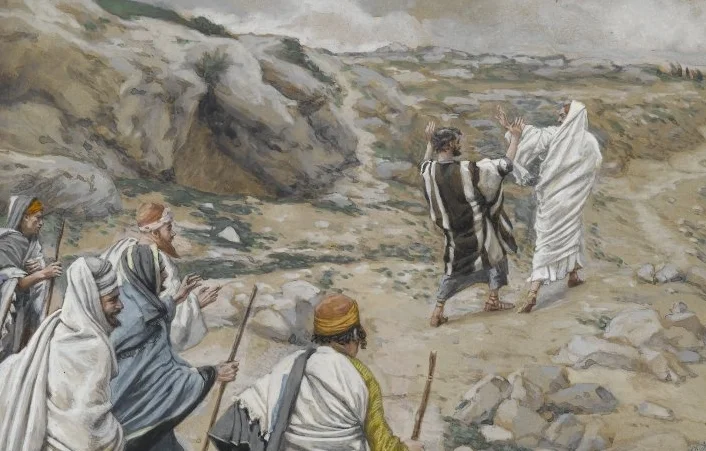Take up your cross
A Sermon preached by the Rev. Nils Chittenden
Sunday, FEBRUARY 25th, 2018
In the story of Jesus’ life and ministry, the gospel reading that we’ve just heard comes right after his return from spending forty days in the wilderness, where he faced many extraordinary and heart-wrenching temptations.
'The Temptation of Christ' by Ary Scheff
On the face of it, we are familiar with at least three of these temptations –he was so hungry that he was tempted to turn the stones of the desert into bread. Then the devil stood before him and played out for him a scenario where he was the earthly ruler of all the world’s kingdoms. And then the devil took him to the pinnacle of the Temple in Jerusalem and said ‘Go on, why don’t you jump off.... Go on, why don’t you, prove your power.... you’ll be fine, the angels will save you...’
However many and varied tempting scenarios Jesus had to endure, these three are representative of all of them. As he struggled to come to terms with his identity, and what it meant to be sent by God to save the world, his mind kept on going round and round with those same three basic temptations. And what are those temptations?
Jesus had taken himself out into the harsh and arid Judean desert, rocky, forbidding and dangerous. He was there for forty days, and he was fasting. It is hard for us to imagine the kind of hunger he experienced, and his craving for food. He knew he could turn the rocks and boulders into bread if he wanted to and he wanted to so badly. It would have been so easy to feed his own comfort. It was right there, that power. He was God incarnate. He made the world. It would be so simple. Yet he resisted the quick fix, he resisted giving in to that personal comfort, because he knew that if he did, it would be the thin end of the wedge, and it would have weakened his resolve in other ways.
But still he was tormented. He knew that there were so many people who were skeptical about his claims to be the very Son of God. Perhaps he doubted it himself as well, sometimes? Well, there were ways to prove it to everyone, put it beyond any kind of doubt. He imagined himself at the top of the Temple roof – at the very pinnacle – and throwing himself off, forcing God to intervene and send angels to save him. Then everyone would know, wouldn’t they? And that would be good, wouldn’t it? That everyone would know that he truly was the Son of God. Wouldn’t that be good? Yet, on the other hand, he knew that, no, it wouldn’t be good. What’s ultimately more powerful? A power that needs to be proved, or one that doesn’t?
'The Temptation in the Wilderness' by Briton Rivière
‘Why’, he must have asked himself so often, ‘why on earth am I here? I’ve been sent to inaugurate God’s kingdom on earth. I’ve been sent here to bring all powers and rulers under God’s rule. That’s why I’m here, isn’t it? So, why don’t I just claim those thrones and palaces right now? I am all-powerful, I can expel demons, I can heal diseases, I can even bring people back from the dead. There’s nothing I can’t do, so why can’t I just depose those princes and take their realms? I could throw out the Romans, reassert Judaism as the only way, institute a benign dictatorship. Plus, I wouldn’t have to die’This, too, Jesus resisted. He knew as well as any careful thinker today that there’s no such thing as a benign dictatorship. It’s an oxymoron. He might have gained the world, but he would have lost everything that mattered: he would have forfeited the ability to love without coercion.
Although we are used to hearing the story of Jesus’ temptations in the wilderness, and seeing it in our minds’ eye as a set of external events being played out in front of Jesus, let’s be clear here, as I was saying last week, that this was a full-scale battle of competing thoughts and desires inside Jesus’ own head – just like temptation is for any of us.
I don’t think we can very easily even begin to imagine the scale of sheer stamina and will-power that Jesus had to find in himself in order to combat those temptations – those very, very real temptations. So, when he eventually brings himself back from the desert and finds his friends again, it is hardly surprising that he wants to share with them what he has just been through. And we know he must have shared these experiences because that’s the only way that we could have the record of them that we do – there was no one else with Jesus in the desert, after all. And this is where we pick up the story – Jesus sharing with his disciples what he has just been through, and the clarity that he now has about his mission as a result – what he’s been sent by God to do. That clarity that says that there is no easy way out, that there is no quick fix, that there is no such thing as a benign dictatorship, and that he has to place his absolute faith and trust in God. So when he tells them how his life is going to pan out, and that he’s in fact going to suffer and die, and Peter is dismayed and disappointed and tells him so, little wonder that Jesus bites his head off.
'Get Thee Behind Me Satan' by James Tissot
Suddenly it is easy for us to see how Jesus, who has already had to endure 40 days of such thoughts, cannot face any more of it. He’s like a coiled spring by this point. “Get behind me, Satan”, he shouts at Peter. And calling the crowd around him and the disciples, he goes on to say,
‘If any want to become my followers, let them deny themselves and take up their cross and follow me. For those who want to save their life will lose it, and those who lose their life for my sake, and for the sake of the gospel, will save it. For what will it profit them to gain the whole world and forfeit their life? Indeed, what can they give in return for their life?’
Jesus is addressing these remarks to four audiences, I think.
First, he is addressing the disciples.
Next, he is addressing the crowd around them.
Then he is addressing us, of course, but fourth, I think he is also addressing himself.
Think back to what is at the heart of the temptations he has just endured, and these remarks seem very personal, very apposite. It tells us that Jesus’ was constantly having to battle temptations throughout his whole ministry. Even the night before his death, when he is near breaking point in the Garden of Gethsemane and asks God if he might take this mission away from him. I think that we can derive a lot of strength from the evident fact that Jesus’temptations were not a neat little, discrete chapter in a pre-programmed destiny, but a very real and very human struggle, just as they are for us. Jesus shows us what temptations look like, when we reduce them down to their essential elements, and how we can be aware of their insidious, sneaky presence, and how we can deal with them. In a sense, that’s what taking up our cross is all about. It’s not really about pious deeds, or ascetic self-denial, or courting suffering. It’s about being aware that there is something in life that transcends us, and our personal comfort, and our conditional, coercive love, and our lack of faith that God really is there for us. And it about being aware that whatever we’re going through, Jesus has been through it, too.





